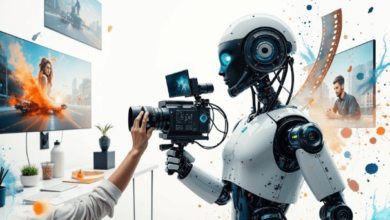How Artificial Intelligence Is Transforming the Job Market

Artificial Intelligence is reshaping the job market in profound ways. Automation is streamlining routine tasks, leading to both job displacement and the emergence of new roles. As industries adapt, the demand for specific skills is changing. Workers face the challenge of continuous learning to remain competitive. The implications of this transformation are significant, raising questions about the future landscape of employment and the skills needed to navigate it effectively.
The Impact of AI on Job Creation and Displacement
As artificial intelligence (AI) continues to evolve, its dual potential to create and displace jobs has become a focal point of economic discourse.
Job automation is reshaping industries, leading to a significant workforce evolution. While some positions vanish, AI simultaneously fosters new opportunities requiring human creativity and oversight.
This complex interplay demands adaptive strategies to ensure a balanced and inclusive employment landscape amid rapid technological change.
Skills in High Demand for an AI-Driven Workforce
Navigating the evolving job landscape requires a keen understanding of the skills that are increasingly in demand due to AI integration.
Key competencies include data literacy and technical proficiency, alongside creative problem solving and emotional intelligence.
Moreover, adaptability skills and a collaborative mindset are essential, enabling professionals to thrive in dynamic environments where human and artificial intelligence converge harmoniously in the workplace.
How AI Enhances Employee Productivity and Efficiency
Artificial intelligence significantly boosts employee productivity and efficiency across various sectors.
By employing AI tools and automation integration, organizations can streamline workflows, reduce repetitive tasks, and enhance productivity metrics.
Furthermore, these technologies foster improved employee collaboration, allowing teams to focus on strategic initiatives instead of mundane activities.
As a result, businesses can achieve greater output and innovation in an increasingly competitive landscape.
Preparing for the Future: Adapting to a Changing Job Market
The integration of artificial intelligence into workplaces is not only reshaping how tasks are performed but also influencing the overall landscape of employment.
As remote work becomes more prevalent, individuals must embrace lifelong learning to remain competitive.
Adapting to new technologies and acquiring relevant skills will empower workers to navigate this evolving job market, fostering resilience and ensuring professional growth in an AI-driven world.
Also read: AI-Powered Voiceovers: Creating Human-Like Narrations
Conclusion
In conclusion, the transformative influence of artificial intelligence on the job market is nothing short of revolutionary. While certain roles face displacement, a plethora of new opportunities arise, demanding a workforce adept in skills like data literacy and emotional intelligence. As AI tools amplify productivity, the imperative for continuous learning becomes paramount. To navigate this evolving landscape successfully, individuals must embrace adaptability and innovation, ensuring they remain not just relevant, but indispensable in this new era of work.




